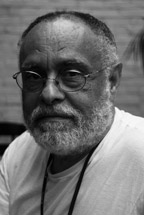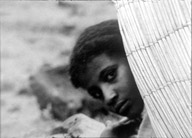Juror
Haile Gerima
 [Juror’s Statement]
[Juror’s Statement]
When I first came to Japan to attend the African Film Festival in 1984, Mr. Ogawa Shinsuke, a man whose work I only knew as a film student in UCLA, invited me to come and visit him at his filming location. At the time Mr. Ogawa had made it part of his cinematic approach to live among the villagers who were the subject matter of his film and bring them into the creative process. I know the universal cliché around filmmakers is “film is collaborative,” when in fact traditional cinema is a most stratified profession, and most film production is fundamentally a profession of dictatorship. To see such an alternative production process successfully practiced was very impressive.
Furthermore, to have screened my film Harvest: 3,000 Years under such circumstances was critically important to me. The farmers in that community of people and the filmmakers who lived amongst them gave me some of the most insightful observation and feedback on my own film.
Mr. Ogawa, along with his crew, were not rushing to finish their film prematurely, but all were committed to give it its fullest time in all stages of film production. Most filmmakers, especially the ones working in mainstream cinema, do not care to give cinema the total commitment to the technical process it inherently asks for. As one Jamaican told me when I shot Sankofa, the devastation left behind after a film production has passed through is like the aftermath of a tornado or hurricane. Go anywhere you see a film location: everyone looks like they’re on steroids, even simple production assistants; they get their walkie talkies and walk the outskirts of the production location pronouncing, “I am cinema.” All along Ogawa and his film crew blended with people of the area and remained simple human beings, not filmmakers.
I find myself caught between two emotions as I prepare to attend the YIDFF: joy and sadness. Sadness because Mr. Ogawa, a good friend who is so well known as a pivotal inspirational filmmaker, and with whom the very foundation of the film festival is identified, will not be there. Joy because I will be returning to the very location where I first met Mr. Ogawa. His effervescent spirit will be very happy to see me return to serve as a jury member in the festival that was established to uphold the artistic commitment of Mr. Ogawa.
| Haile Gerima Born in Ethiopia and educated in the United States, Gerima is devoted to the art of an independent cinema that stresses a symbiotic relationship between African diasporan artists and the larger community. Among the critically acclaimed films that established Gerima’s reputation are Child of Resistance (1972), Bush Mama (1979), and Ashes and Embers (1982). His successful independent distribution of Sankofa (1993), a historically inspired dramatic tale of African resistance to slavery, allowed him to create a film center, located in the heart of the African American community in Washington, D.C. Gerima’s latest dramatic film is Teza (2008). Since 1975, Gerima has served as a distinguished professor of film at Howard University in Washington, D.C. |
Harvest: 3,000 Years
Mirt “Sost Shih Amet” ETHIOPIA / 1976 / Amharic, English / B&W / 16mm / 136 min
ETHIOPIA / 1976 / Amharic, English / B&W / 16mm / 136 min
Director, Editing: Haile Gerima
Photography: Elliot Davis
Music: Orchestra Ethiopia
Music Coordinator: Tesfaye Lemma
Songs by: Gerima Tafere
Assistant Editors: Elliot Davis, Phillip Kuretsky
Appearances: Kasu Asfaw, Gebru Kasa, Worke Kasa, Melaku Makonen, Adane Melaku, Tsehay Ejigu, Harege-Weyn Tafere
Source: Mypheduh Films Distribution
In a small village in Ethiopia, there are large landowners and also peasants forced into a life of hardship and toil. This film depicts everyday life in this village and the resistance of villagers to those wielding authority, centering on exchanges between Kebebe, whose land was absorbed by the landowning class during the Italo-Ethiopian War, and Berihun, a young man strongly influenced by Kebebe’s thinking. The filmmaker shot footage in his native country, using all amateur actors and all-location photography, at the outset of the revolution that ousted emperor Haile Selassie, then brought this footage to the United States, where he completed a film filled with poetic narration and a refined musical sense.
